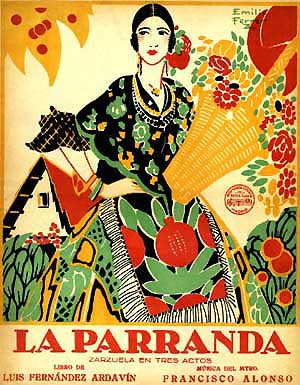 |
La Parranda |
|
This material is © Christopher Webber, Blackheath, London, UK. Last updated June 6th 2001 |
|
|
|
The music, as with his previous great triumph La Calesera, sees Alonso's melodic gift at full tide. His inspiration in La Parranda is just as consistent, his orchestration if anything more subtle and varied. The infectious melodies of the bridal scene, especially the rondalla serenade and famous Song to Murcia, are complimented by a fine love duet, and a full hand of splendidly virile choruses. Indeed, this is a choral zarzuela par excellence, with a generous, theatrical sweep which disarms criticism.
Her friend the simple worker Carmela, supported by her even more simple boyfriend El Retrasao ('backward'), reassures her that all will be well. Six botijeros, makers of those quintessentially Spanish, huge earthenware drinking pots, sing a lively song with Carmela, El Retrasao and the pottery workers (Dúo y coros: "Dame el dineriquio, que yo te guarde") to cheer Aurora's spirits. The workers chat freely, except for the young potter, Miguel, who listens thoughtfully, glancing from time to time at Aurora, who seems to return his interest.
Scene 2. The workshop, some time later. It is a holiday, and Miguel is working quietly alone. When Aurora appears he takes the opportunity to speak out seriously, and in a passionate Dúo: "Mirandome en tus pupilas" they confess their mutual love. Manuel interrupts their idyll, and tries to turn the situation to his advantage by bullying the young woman into compliance. With a rush of blood, the infuriated Miguel runs to her defence, and only the intervention of Carmela and El Retrasao saves the foolhardy boss from serious injury. Naturally he sacks Miguel on the spot, and Aurora bravely decides to leave with him.
Carmela, El Retrasao and the popular moneylender from the local village Don Cuco express their glee at the couple's escape (Terceto comico: "Esta parejita ya me va escamando") Manuel, however, determines that he will find out more about this enigmatic beauty. He asks Don Cuco, who seems to know more about the mystery than anybody else, to tell him everything he knows. This the old usurer tentatively agrees to do - for a price, of course.
Aurora is still nervous about going through with the ceremony, partly for fear of what her old boss Manuel may be planning, and she is about to run away when Don Cuco prevents her, reassuring her that he knows her secret, that she is doing nothing wrong, and that he will find a way to put her mind at ease. The secret is a simple one. When little more than a girl, Aurora was married off by her impoverished parents to a wealthy, old man. On the day of the wedding, her drunken husband responded to a compliment from a young admirer to his wife by cutting the man's throat, and he has been an imprisoned murderer ever since. Shortly after this her parents died, and she moved away to start a new life. The marriage was never consummated, as Aurora confesses to the local Cure, Don Vicente. He has no hesitation in declaring the marriage dissolved, and agrees to officiate at her wedding with Miguel. The workshop boss, Manuel, is still intent on preventing the wedding, but even Cuco has been won over by the young couple, and now refuses to aid him - rather he tries to frighten him off by mentioning an old debt that he is owed by the landowner. Rather than bear the pain of watching the wedding ceremony, Manuel leaves, swearing to have his revenge - he thinks he already knows enough to act.
Awaiting the bridal pair's return from church, Carmela sings a vocal "Offering" (Ofrenda: "Un regalo a la novia quieren hacer".) They are greeted with a festive, choral ensemble "Boda de rumbo es esta boda", which incorporates the refrain of the earlier love duet - as well as a catchy song for El Retrasao "Esta noche varias cosas quisiera ser y no ser", bawdily insinuating the joys of the wedding night. Despite all this good humour, Aurora's secret is still gnawing at her conscience, though Miguel tries to raise her spirits with a beautifully turned aria in which he praises his wife's smile as a jewel above price (Romanza: "Diga usted, señor platero"). Celebrations reach a climax in the general song and dance Las Parrandas: "Cantares, que alegres del alma salen", but are rudely cut short by the arrival of Manuel, now accompanied by the local police, who publicly accuses Aurora of bigamy. Miguel tries to prevent his wife's arrest, but to no avail. To save her husband from committing violence, Aurora confesses. Don Vicente's assurance that the marriage had ecclesiastical dispensation is not enough to save her from detention. The officials take Aurora away to prison until the situation can be clarified.
